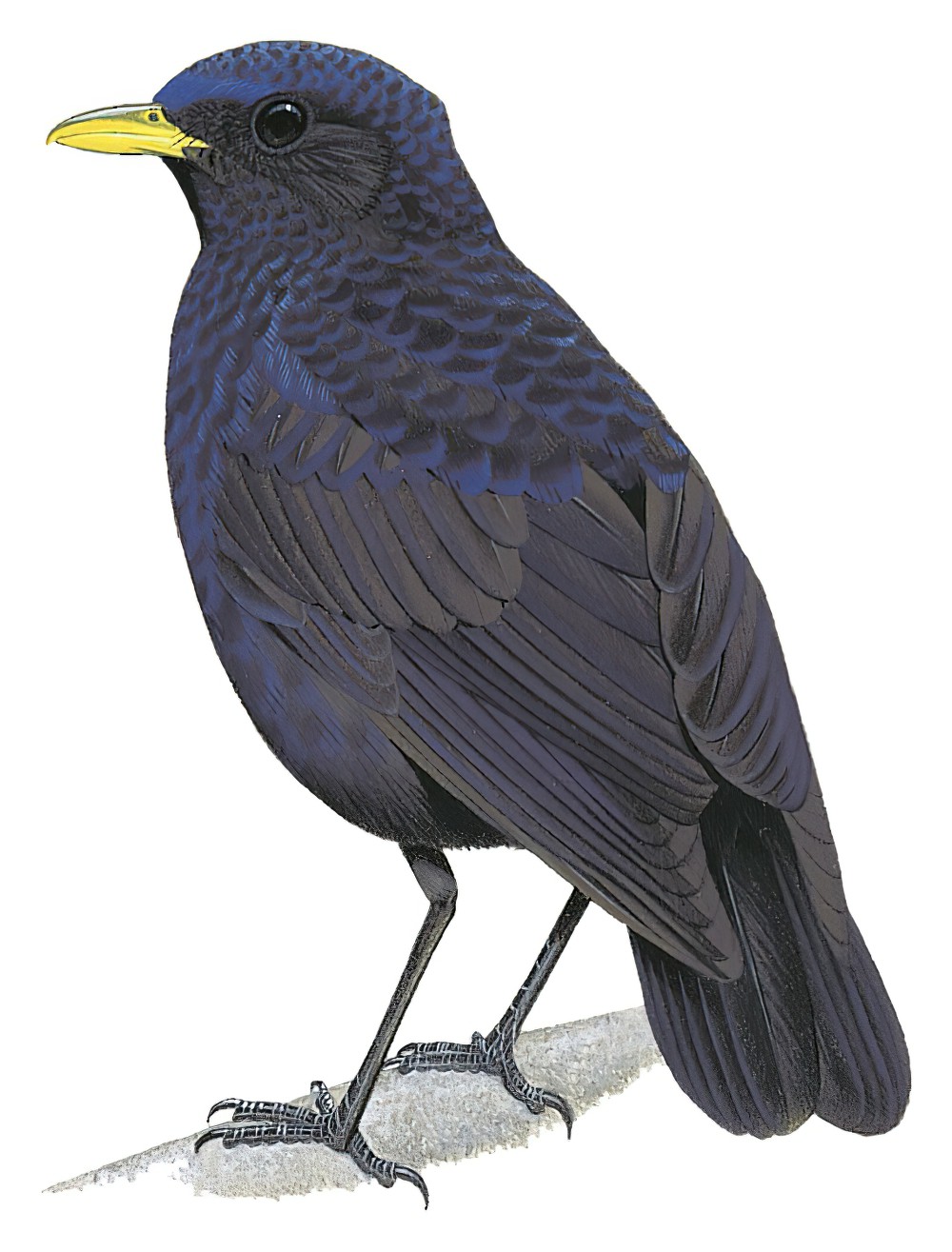Malayan Whistling-Thrush / Myophonus robinsoni

Malayan Whistling-Thrush
SCI Name:
Protonym: Myiophoneus robinsoni Bull.Br.Orn.Club 15 p.69
Taxonomy: Passeriformes / Muscicapidae / Myophonus
Taxonomy Code: mawthr2
Type Locality: Gunung Menkuanghebah, Selangore.
Author: Ogilvie-Grant
Publish Year: 1905
IUCN Status: Near Threatened
DEFINITIONS
MYOPHONUS
(Muscicapidae; Ϯ Blue Whistling Thrush M. caeruleus flavirostris) Gr. μυις muia, μυιας muias fly; φονευς phoneus slayer < φονος phonos murder < θεινω theinō to strike (cf. μυοφονος muophonos mouse-killer < μυς mus, μυος muos mouse); "MYOPHONE LUISANT. MYOPHONUS METALLICUS. TEMM. ... Le Myophone qui fait le sujet de cet article se distingue par un bec très-gros, fort et dur; quelques soies roides garnissent l'ouverture de ce bec, et de petites plumes tournées en avant couvrent la grande membrane qui tapisse les fosses nasales; les tarses sont très-longs; la queue est carrée et les ailes couvrent un tiers seulement de sa longueur" (Temminck 1822); "Les Myiophones sont confinés dans les régions chaudes de l'ancien continent, dont ils habitent les plus hautes montagnes de 4,000 à 7,000 pieds d'élévation au-dessus du niveau de la mer, où ils vivent solitaires parmi les rochers couverts de ronces qui produisent des baies, et dans les endroits les plus touffus des forêts en montagnes, où on les voit se repaître aussi d'insectes et de vers" (Temminck 1832); “Temminck [Pl. Col., livr. 29, pl. 170] in his generic description, spells the new genus Myiophoneus, and on the following page accompanying plate 170 spells it “Myophonus.”” (Ripley in Peters 1964, X,140); “If stability in ornithological nomenclature be considered desirable, why are we asked to use a so-called emendation (in fact a wholly new generic name!) that first appeared in print some ten years after the simple, easily spelled and easily pronounced Myophonus Temminck of 1822?” (Deignan 1965); “In Peters Check-list of Birds of the World, X, Ripley (1964) adopted the spelling Myiophoneus as the generic name for the whistling thrushes ... What this hides is that the text associated with livraison 29 appeared in two parts, both marked with that livraison number, yet separated by some ten years, the first part in 1822 and the second no earlier than 1832” (Dickinson 2001).
Var. Mycophoneus, Myiophoneus, Myiophonus, Myophoneus, Miophonus, Myophorus.
Synon. Arrenga.
robinson / robinsoni / robinsonii
● Herbert Christopher Robinson (1874-1929) British ornithologist, systematist, collector in Australia 1896, and Malaysia 1908-1926 (syn. Aerodramus maximus, syn. Alectura lathami, subsp. Alophoixus pallidus, subsp. Chalcophaps indica, subsp. Cissa chinensis, subsp. Enicurus maculatus, subsp. Gecinulus grantia, subsp. Heterophasia desgodinsi, subsp. Macropygia amboinensis, syn. Megalaima australis duvaucelii, syn. Myiagra cyanoleuca, Myophonus, subsp. Oriolus traillii, subsp. Picus guerini, subsp. Pteruthius aeralatus, syn. Pycnonotus blanfordi conradi, syn. Rallina tricolor, syn. Rhipidura albicollis atrata, subsp. Strepera graculina, subsp. Treron sphenurus).
● Col. Wirt Robinson (1864-1929) US Army, who taught chemistry at West Point 1906-1928, ornithologist, collector (syn. Butorides striata, syn. Cardinalis phoeniceus, syn. Zenaida auriculata stenura).
● Dr Anthony Robinson (d. 1768) English surgeon, botanist, resident in Jamaica (syn. Pyrrhulagra violacea ruficollis).
● Robinson Crusoe, literary character who was shipwrecked but survived on a desert island, created by Daniel Defoe 1719; the character was heavily influenced by the adventures of the privateer Alexander Selkirk (1676-1721) who survived several years on the uninhabited island of Juan Fernandez (syn. Sephanoides fernandensis).
UPPERCASE: current genus
Uppercase first letter: generic synonym
● and ● See: generic homonyms
lowercase: species and subspecies
●: early names, variants, mispellings
‡: extinct
†: type species
Gr.: ancient Greek
L.: Latin
<: derived from
syn: synonym of
/: separates historical and modern geographic names
ex: based on
TL: type locality
OD: original diagnosis (genus) or original description (species)












